Portfolio Management
Strategy
A recent survey showed only 5% of employees are aware of and/or understand their company’s strategy. Even in top-performing companies with “clearly articulated strategies,” 71% of employees cannot recognize their own company’s strategy in a multiple-choice question.” Source: ArchPoint Consulting
This situation causes lack of engagement. How can one possibly do their best work without understanding the purposes of that company? WGA has a fundamental fix for this, and it is included in the solutions for the engaged enterprise™.
WGA’s client experience indicates the strategy is often sound thus not requiring significant, if any, modifications. There are subsequent steps that are required to apply to the strategy that improves its quality. Once completed, a communication plan is developed with the client and executed to ensure that all employees know and understand the strategy. This will improve the connectedness of the employees and their daily tasks to the purposes of the organization by providing meaning, flavor, and context.
Project Selection
Now that the strategy has been developed and communicated, it is time to select projects which will support and lead to accomplishing the strategic objectives.
Resource Allocation
Management now assigns Project Managers to projects and functional managers supply the technical resources for project teams. WGA recommends a particular set of simple processes and tools to automate this activity. After staffing projects, the work is turned over to Project Management/Product Development.
Project Management Training
Step 1- PM Fundamentals training for 25-50 people
Step 2- Hybrid Certification for PM’s and/or PMP Certification;
Step 3- Microsoft Project Training for PM’s/Schedulers;
Project Management Consulting
Project Management Office (PMO) Implementation
WGA has implemented PMO’s for the past 20 years. It is an organizational structure we highly recommend because it is efficient and cost-effective. Only those in the PMO need training, certifications, tools, and templates. The rest of the organization can go about its business while the PMO Project Managers lead strategic projects and role model PM better practices for the company.
WGA has evolved the PMO into the Agile PMO (a-PMO™), which is a feature of the engaged enterprise™. This change reflects WGA’s commitment to add ever more value to our services for the benefit of clients.
PMO Assessment
This 5-day period allows WGA to share options for the a-PMO™ structure with the client. The options include either a hard-coded PMO (new org structure), or a virtual PMO. Click here to purchase and download the readiness package that allows WGA to shorten the Assessment period from 5 days to 2 days. WGA will spend 2 days onsite with client decision-makers finetuning the scope of work, validating structure, client objectives, deliverables, and resource commitments for the implementation.
PMO Proposal
From the data gathered during the Assessment, WGA will develop a comprehensive, fixed price technical and business proposal for the implementation. After negotiations are completed, a final version of the proposal will be signed by the client and WGA and the proposed schedule for the implementation will be updated with kickoff date agreed to.
PMO Pilot
WGA recommends a client pilot team be selected as well as a pilot project as a means to exercise and prove out the tools, templates and processes used in the pilot. The pilot team will assist in the development and adoption of PMO processes and tools. They will also receive requisite PM training and PM tool training, and will plan and execute the pilot project under the with direct assistance from the WGA implementation team. Upon completion of the pilot project, the implementation client/WGA team will analyze pilot performance and make and necessary changes to processes, and/or tool configuration in preparation for the rollout of the a-PMO™ to production status.
PMO Rollout
The features of this phase include user training for all PMO Project Managers and team members on the processes and tools, as well as any required data migration to the new PM tool. A cascading rollout plan is developed to transition project teams finishing up projects using the old processes to the new processes. WGA consultants coach and guide during the rollout until they reach proficiency.
PMO Support
Post rollout, WGA will propose and provide ongoing support for the a-PMO™ via an annual support agreement.
Portfolio and Project Management Tools
Project Online (POL) and Microsoft Project
Every organization relying on strategic projects for its success should have an enterprise-class PM software tool that automates collaboration, reporting and updates. The PM tool should be easy to learn, have familiar interfaces, and be configurable rather than requiring custom coding. WGA has been a Microsoft partner for 19 years and in the current market, Project Online is the most cost-effective, the most collaborative (uses SharePoint as its engine), the most familiar (works inside the O365 tenant), and has the most powerful Business Intelligence tool (PowerBI) as a feature. POL is easy to spin up, quick to configure and the user training is minimal. This powerful software PM tool yields automated weekly and monthly status reports for PM’s and Management and is easy to maintain.
POL Features
Dashboards by Program
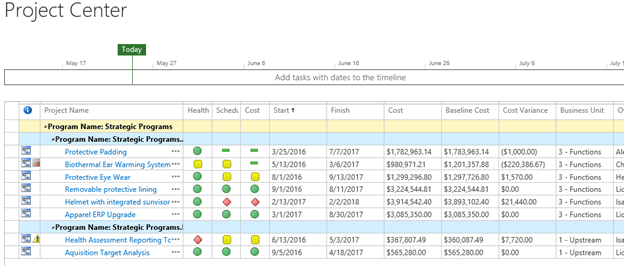
Dashboards by Project Phase
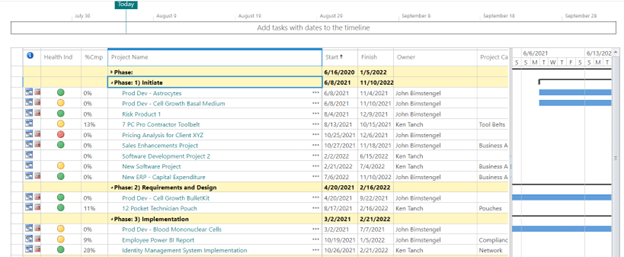
Resource Availability/Allocation
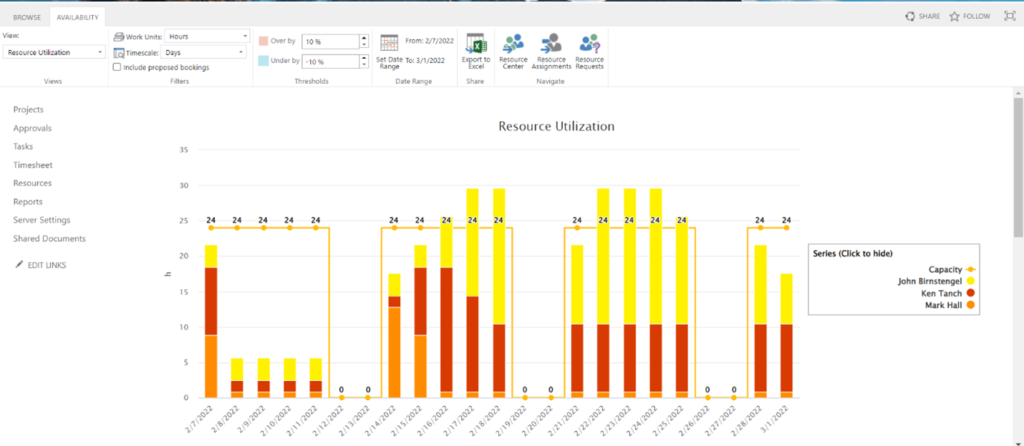
Resource Heat Maps
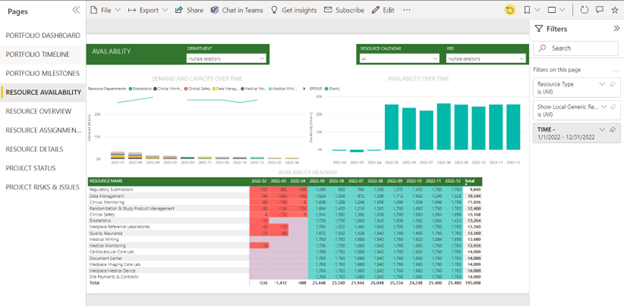
Portfolio Reports using PowerBI
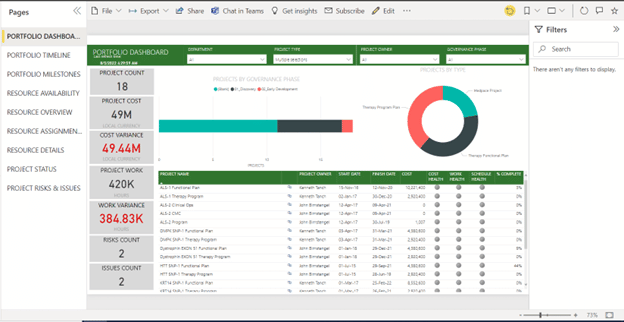
Project Online = short money, easy to use, quick implementation, large ROI.
Please click HERE for more information about Project Online
Microsoft Project® Desktop Client
For desktop-based deployments, WGA recommends Microsoft Project® and offers a 2-day course to help you master the skills necessary to successfully use Microsoft Project® in any demanding project management environment.
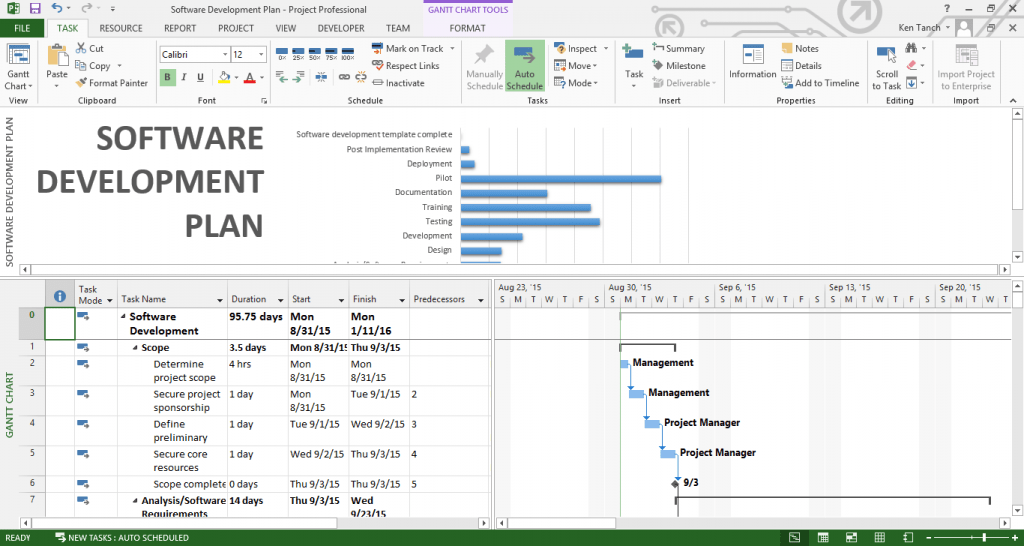
Microsoft Project® Course
2 Days: Course MSP14
Course Description:
This course is a 2-day hands-on course that teaches students how to use and apply Microsoft Project® software tool to real-world projects
Who should attend?
Project Managers, Program Managers, Team Members, PMO Directors, IT professionals, Project Planners, Business Analysts, Product Managers, R&D Engineers, Consultants, Government Contractors, Small Business Owners, Anyone wanting to learn or brush up on this scheduling software tool.
PMI Process Groups covered:
Planning, Executing, Controlling
PMI Knowledge Areas covered:
Scheduling, Scope, Budgeting, Risk
Key Tools and Takeaways:
Key features of the scheduling software including creating a project, assigning resources, linking tasks, performing earned value analysis, baselining a project plan, adding cost information.

Please Click here to schedule a discussion about any or all of our Portfolio and Project Management Training and Consulting offerings

